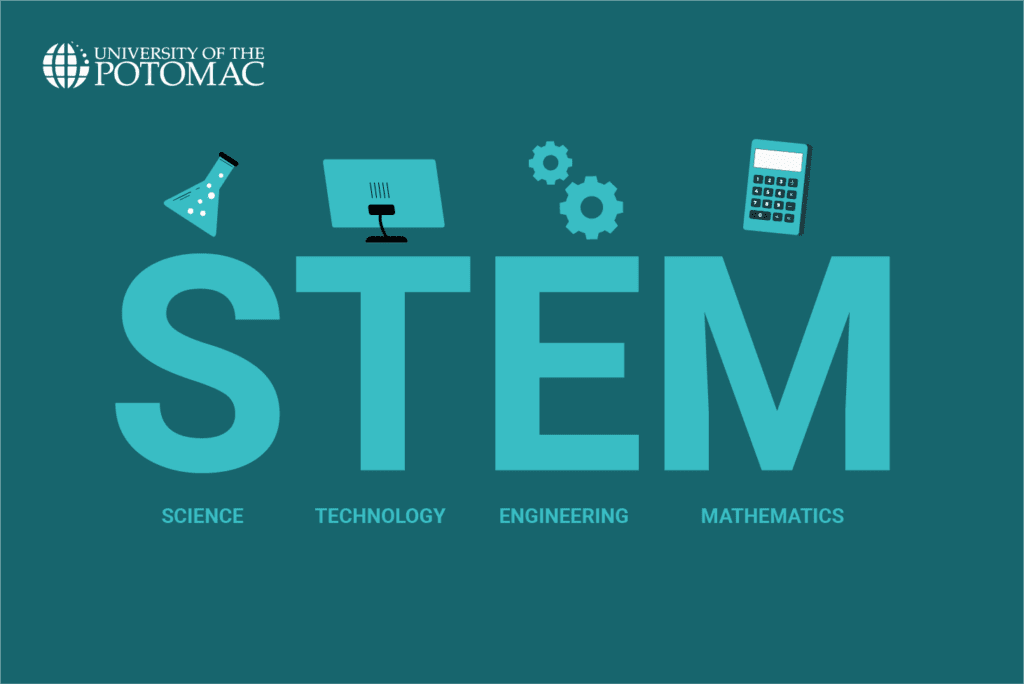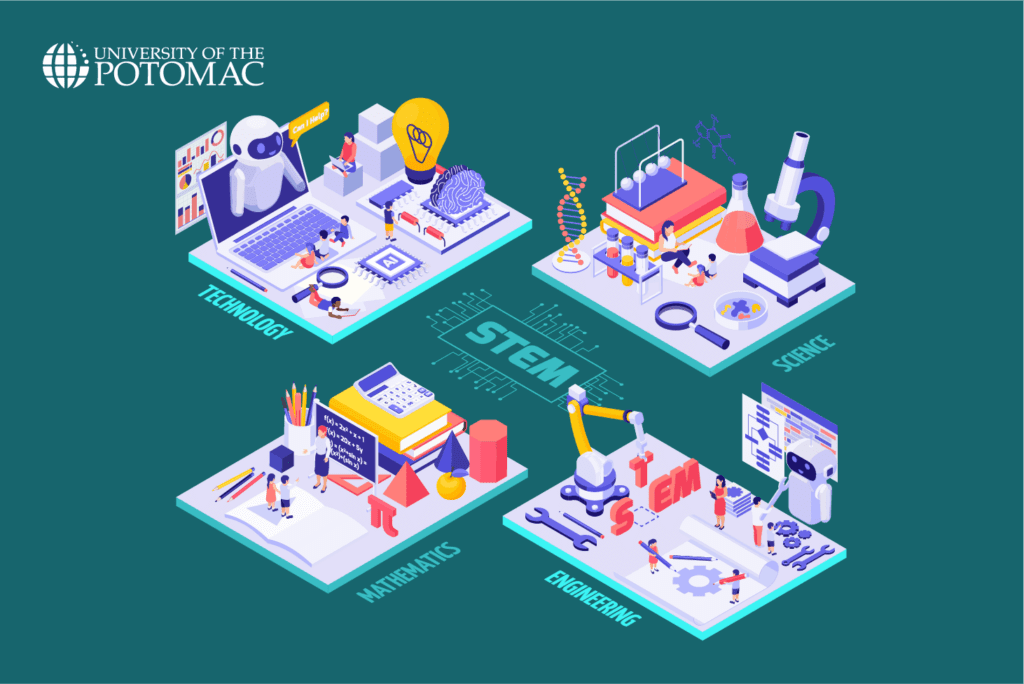STEM education is an interdisciplinary approach to teaching that combines science, technology, engineering, and math. Follow along to learn more about this modern approach and its ever-growing importance today.
Many countries are making constant efforts to increase the number of graduates in STEM majors to support the growth of numerous technology and engineering fields. According to the latest data, students in Malaysia and Tunisia are the most likely to graduate in a STEM field, with 43.5% and 37.9%, respectively.
But how exactly does STEM education impact the future?
The workforce of the future requires diverse skill sets and creative and responsible thinkers. To fill these skill gaps, STEM education aims to provide instructional environments that show students how the scientific method can be applied in an everyday context. Simply put, STEM education focuses on practical problem-solving applications in the real world.
Join us to find the answer to “What is STEM education?” and more. We’ll list popular STEM majors, career opportunities after graduating, and the compensation you can expect in a career in STEM.
STEM Education Definition

STEM education includes four areas of study: science, technology, engineering, and mathematics. These four disciplines emphasize problem-solving, critical thinking, and innovation.
Therefore, STEM education encompasses an interdisciplinary methodology that trains students to use multidisciplinary knowledge to solve problems. Additionally, students take a rigorous and diverse course load and develop a strong work ethic.
This approach favors the development of a student profile that is motivated, flexible, and determined, allowing them to apply their learning to various industries and career paths. Moreover, it focuses on the practical applications of problem-solving in new situations and contexts, making STEM career profiles sought after because they align with technological advancements in society.
Why STEM Education Is Important
Each area of study in STEM education significantly impacts the modern economy and society as a whole. From transportation to communication, STEM is the backbone of the contemporary world.
Therefore, STEM education is vital in building real-world knowledge and skills that are based on problem-solving, collaboration, and innovation.
However, to truly understand the importance of STEM education, we should also consider its value in fields beyond science and technology. Many skills developed in STEM education can be transferred across multiple industries, either in a STEM-focused career or another path. For example, marketing professionals can benefit from a basic understanding of statistics.
The Benefits of STEM Education
One of the biggest benefits of STEM education is that it prepares students for 21st-century careers by developing useful skills beyond the classroom. Now, let’s dive into the benefits of STEM education.
- Fosters critical thinking and problem-solving skills, essential for enabling students to think creatively and independently and apply complex ideas and concepts
- Supports ingenuity and creativity through risk-taking work and experimentation, allowing students to develop novel solutions to problems
- Ties into hands-on and project-based learning, increasing engagement and excitement about the subject
- Builds active learning skills by encouraging students to be more proactive in their assignments
- Encourages the development of collaboration and communication skills through group activities, helping students communicate their ideas and talk through problems
- Develops skills such as resilience and adaptation by requiring students to try many different options when the initial solution doesn’t give them the right results
- Promotes equity in education by ensuring that STEM programs are open to learners of diverse backgrounds
- Relates directly to job-related skills in high demand across various industries, preparing students for careers that may not even exist yet
STEM-Based Programs at UOTP
At UOTP, we offer unique STEM programs built by a faculty of industry leaders and academic experts who know what it takes to succeed in today’s professional market. Our STEM-based programs include:
Associate’s Degrees:
Bachelor’s Degrees:
- Bachelor of Science in Computer Science
- Bachelor of Science in Cybersecurity and Policy
- Bachelor of Science in Geospatial Information Technology
- Bachelor of Science in Information Technology
- Bachelor of Science in Health Information Management
Master’s Degrees:
- Master of Science in Computer Science
- Master of Science in Data Analytics
- Master of Science in Information Technology
- Master of Science in Geospatial Information Technology
- Master of Science in Healthcare Informatics
Doctoral Degrees:
We understand that attending college is more than listening to lectures and studying in the library. That’s why we cultivate dynamic environments outside the classroom for all students to learn, build community, and develop a sense of belonging. Check out our Geospatial Intelligence Center for Excellence, where you can attend geospatial meetups and conferences in the DMV area.
Careers You Can Pursue With a STEM Education

STEM education offers an array of career paths. Here is a list of some STEM careers you might consider pursuing after college.
Science:
- Astronomer
- Environmental Specialist
- Psychologist
- Zoologist
Technology:
- Cybersecurity Analyst
- Computer Network Architect
- Database Administrator
- Software Developer
- Civil Engineer
- Chemical Engineer
- Electrical Engineer
- Mechanical Engineer
Mathematics:
- Accountant
- Data Scientist
- Meteorologist
- Statistician
Average Salaries You Can Expect When Graduating With a STEM Education
One of the most direct and powerful arguments for the importance of STEM education is its relevance to the workforce. In 2021, the U.S. Bureau of Labor Statistics (BLS) found that STEM-related occupations had almost double the average salary compared to the national average for all occupations.
Additionally, the value of a STEM degree goes beyond salary—it offers job stability and opportunities for continuous learning and growth. This is because STEM skills are sought after in many occupations and translate well across professions.
The BLS projects a 10.4% increase in the number of STEM jobs in the 2023-33 period. That’s significantly higher than the 4.0% average growth for all occupations over the same period.
Let’s take a look at the average salaries and estimated employment growth percentages for some popular career paths in STEM.
Interested in pursuing a degree?
Fill out the form and get all admission information you need regarding your chosen program.
This will only take a moment.
Message Received!
Thank you for reaching out to us. We will review your message and get right back to you within 24 hours.
If there is an urgent matter and you need to speak to someone immediately you can call at the following phone number:
- We value your privacy.
| STEM Careers | Average Salary | Job Outlook |
| Science | ||
| Astronomer | $127,930 | 7% |
| Environmental Specialist | $78,980 | 7% |
| Psychologist | $92,740 | 7% |
| Zoologist | $70,600 | 4% |
| Technology | ||
| Cybersecurity Analyst | $120,360 | 33% |
| Computer Network Architect | $129,840 | 13% |
| Database Administrator | $104,810 | 8% |
| Software Developer | $138,110 | 18% |
| Engineering | ||
| Civil Engineer | $101,160 | 9% |
| Chemical Engineer | $122,910 | 10% |
| Electrical Engineer | $117,680 | 9% |
| Mechanical Engineer | $105,220 | 11% |
| Mathematics | ||
| Accountant | $90,780 | 6% |
| Data Scientist | $108,020 | 36% |
| Meteorologist | $89,350 | 6% |
| Statistician | $109,190 | 12% |
The Bottom Line
Today, we face an unprecedented need for scientists, engineers, and leaders in problem-solving. Therefore, STEM education is a sought-after approach that can prepare students for the challenges of the modern world. It also offers diverse career opportunities, higher earning potential, and personal fulfillment from contributing to society.
At UOTP, we believe in the transformative power of STEM education and its potential to shape minds. So, we welcome you to explore our STEM-related programs or attend a STEM-focused event on campus!
Frequently Asked Questions (FAQs):
How do STEM classes differ from regular classes?
STEM classes differ from regular classes in that they aim to provide instructional environments for blended learning and are committed to showing students how to apply the knowledge and tools they’ve learned in class in a real-world context.
Who qualifies as a STEM student?
A STEM student is someone who studies in the fields of science, technology, engineering, or mathematics.
Do STEM graduates earn higher salaries?
Yes, reports show that STEM graduates earn higher salaries. One reason they earn more is that many industries, such as technology, healthcare, and engineering, are rapidly growing and require specialized knowledge and skills not easily found in the job market.










